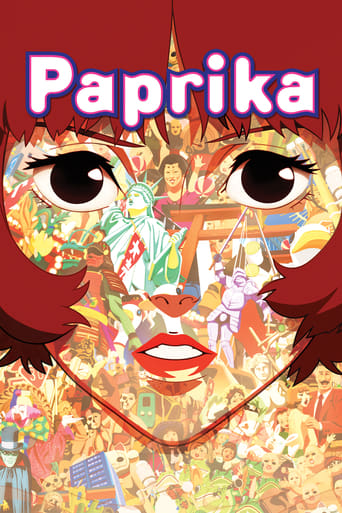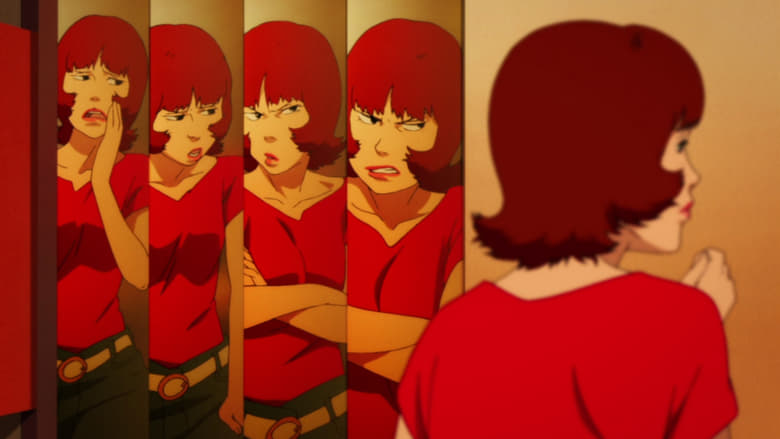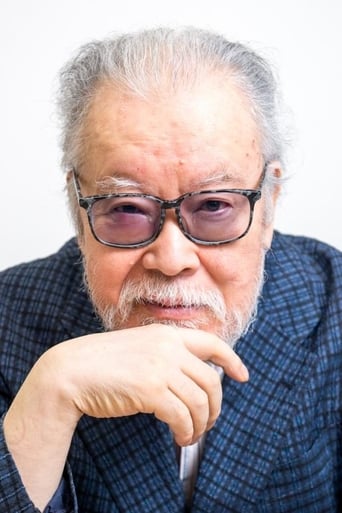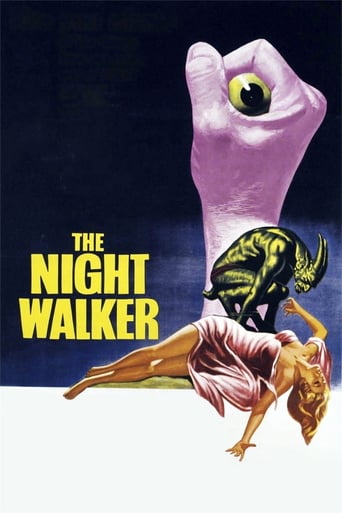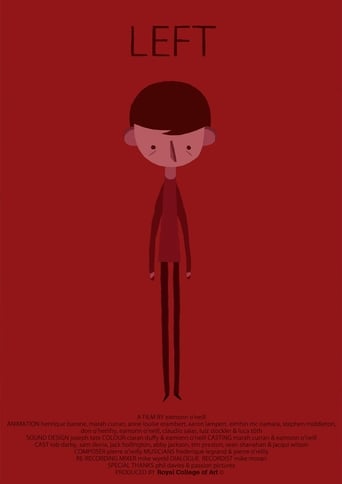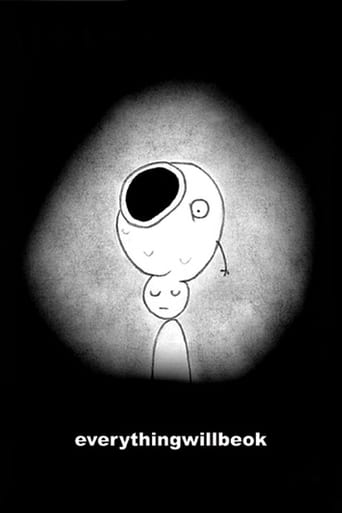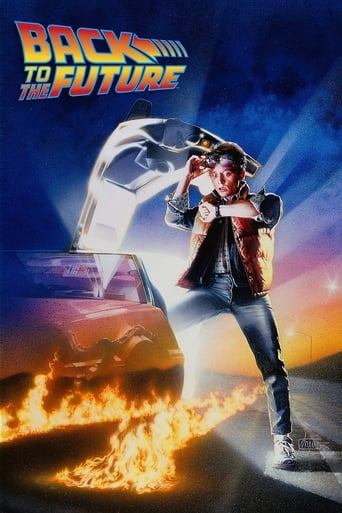Paprika (2007)
When a machine that allows therapists to enter their patient's dreams is stolen, all hell breaks loose. Only a young female therapist can stop it and recover it before damage is done: Paprika.
Watch Trailer
Cast



Similar titles
Reviews
I love this movie so much
The film creates a perfect balance between action and depth of basic needs, in the midst of an infertile atmosphere.
While it doesn't offer any answers, it both thrills and makes you think.
An old-fashioned movie made with new-fashioned finesse.
Satoshi Kon's final work Paprika is a colourful, energetic and surreal trip. It's a film that asks us 'what is reality?' and for the most part does a great job of exploring the relationship between dreams and the real world. Filled to the brim with remarkable visuals from Madhouse, a good level of story complexity and even some commentary on the topic of cinema itself, it's a big love letter to industry. While Paprika is a visual feast and directed with great attention to detail, it's a shame that the story sacrifices clarity for surrealism at moments when questions need to be answered. The story contains a mix of ideas touching on ethics, discovering one's purpose and what defines reality. Some of these ideas get ditched and others explored in greater detail, but the end result is still a very memorable film.Our story follows Atsuko Chiba who uses newly created technology without permission, which allows people to share dreams, to help patients with stress in the form of an alter ego Paprika. Trouble starts when versions of the device with no security fall into the wrong hands. This would allow the culprit to enter the dreams of others and cause untold amounts of deeply rooted psychological damage, even enough to destroy one's psyche. I found myself actually drawn more towards the story of detective Toshimi Konakawa and his attempt to understand why his dreams are affecting him deeply at a psychological level. He is without a doubt the most deeply explored character, as one of Chiba's patients. His attempt to overcome the unsolved case at his job is starting to toy with his mind and his past becomes caught up in these thoughts. Every time his dream came to the fore I was captivated. I thought the payoff for his journey was slightly underwhelming. Yet at the same time I knew the ending was only appropriate things take the direction they do considering the themes of the film - hiding our true feelings and creating a new reality so we don't have to face the other one.It's only appropriate that our main character Chiba be the one to best represent the idea of discovering one's true self. While the film initially posits Paprika as a façade for her to treat others you start to question whether her fake persona is actually a better representation of her true self – someone more free spirited and approachable. While the internal struggle isn't as plainly laid out for the viewer to see compared to Konakawa, it's definitely there. Kon's clever direction goes a long way to achieving this. From the repetitious use of glass to mirror Chiba's other side of herself or the almost unnoticeable cut between reality and dreamscapes, it all works. Chiba herself isn't actually that interesting of a character at face level, though that's quite intentional. She has a cold demeanor, exuding this barrier of defence around herself. Paprika acts as a means to express her repressed emotions. As a collective, the two more are complete and fulfill what the other lacks.On my main criticism: Paprika as a film does little to explain the boundaries and the rules of its world and instead lets the film play out as an 'experience'. Even the exposition of the movie isn't clear at first. Though this lends to being entertaining it hinders the exploration of its themes. Something being intentionally difficult to understand without giving us an explanation doesn't instantly make something amazing, it can be infuriating. While I actually like the idea of figuring things out for yourself and applying your own interpretation to things, there's some cases where we need boundaries explained. This is one of those cases, in a film blending technology and the subconscious. The film's ending actually starts to go against our understanding of reality and I just took it as one of those things I'll have to accept. It actually reaches a point of absurdity that took me out of the experience. On top of this, the antagonist isn't that interesting and gives the grand finale an underwhelming amount of impact. On the topic of visuals, a much more positive point, I rarely see animation so good that I actually find myself saying 'wow' as I'm watching it. There are so many moments full of warped transitions, literal world-bending scenes that are breathtaking. Kon loves flow between scenes. His scene transition here was at master-level. It keeps the film dynamic and does a great job of keeping you engaged. The opening credits scene in particular is one of the most memorable moments which showcase this fluidity to Kon's direction. If you're also looking for a movie that utilises repetition well then this is the one for you. It allows to see several things, such as how far our characters have overcome their psychological problems or seeing things in our dreams that makes us reflect upon reality. Paprika is a must watch. Story-wise it may get a bit too big for its own boots but it's the perfect example of the journey sometimes being worth more than the destination.
I watched this film with my mother this evening when she said she'd recorded it for me on her Virgin Plus box whilst it was showing on Film Four this February. When I looked this up right here on IMDb, I liked its concept of dream analysis and I saw that this was directed by the same person as 'Perfect Blue' (which I found preferable and easier to follow yet more intense than this one), the late Satoshi Kon. Whilst watching this, I was impressed with the colourful visuals if they were bizarre but I found the story weird, weird, weird and so hard to follow that my mum had to pause the film to explain its story to me.As one reviewer had already observed, the animation is quite choppy and in my opinion it wasn't as good as the animation in 'Perfect Blue' let alone that in Studio Ghibli films. On a more positive note the human character designs differ from those in Studio Ghibli films but they are well-shaded, the rest of the characters are designed in a surreal manner and the backgrounds are a mixed bag - sometimes they looked realistic and at other times they looked as if they were rendered using cheap CGI. Both the editing and the soundtrack are decent if repetitive in places although I did like one piece of music that had dramatic choral vocals. I watched the original Japanese dub of this with English subtitles and while I didn't understand most of the spoken dialogue, some words were spoken in English (such as DC Mini - the dream-analysing device) and I found the subtitles very helpful. Although my mum laughed at this film more than I did, the funniest part for me was when Paprika's name was mentioned in a spice joke during the climax in which dreams and reality combine. While most of the characters are pretty bland and indescribable, I found Tokita a stereotype of an obese person by ordering a lot of food at one point while Chiba/Paprika and Himuro are convincing masters of disguise. The pace was mostly slow and the ending was abrupt and slightly disappointing.Overall this doesn't live up to the standards of Kon's earlier work 'Perfect Blue' or Studio Ghibli's output and the story was hard to get the gist of but the visuals were vibrant and surreal yet stunning. 7.5/10.
Do we want our dreams to become our reality? Is our dreams the answer or the question to that reality? How does our dreams shape how we see our self's in real life? This is just a few "little" questions that Paprika manages to raise in its explosive 90 minutes screen time. The creative power and sheer imagination which it portrays during this time is indeed impressive. Combine that with themes of life and death, love, dreams, technology etc. and it's still manages to be enjoyably encompassing. It's really science fiction at its best!Of course this isn't news for fans of the late Satoshi Kon, who has showed us a new side of our self's with each new film he has created. The psychology of dreams has been pretty much in all of his film and each time with an new angle for us to consider. While his other films has touched upon the subject of memories more than dreams, I feel both has been present throughout and that dreams got the spotlight this time.I rated this film the lowest of all of his films, but still I gave an 8/10, which isn't low by any stretch of the imagination. What I felt was different in this film and what I felt had diminished was the focus on the characters over the ideas. In this film the characters took a backseat to what ideas he wanted to put up front. I felt that the characters suffered somewhat to the spectacle of the incredible animation which took over more and more. His other films had it the other way around and felt more personal in nature, they emphasized the drama/thriller aspect of the story. Here the science fiction takes over towards the third act, and the film becomes a much more abstract conversation with the viewer instead of an emotional understanding.Still, a really great film that's gorgeous to look at, and one of the few films that really captures the absolute chaos of fantasy in dreams. Films like these are probably the closest we will come for some time, to the technology of sharing dreams as portrayed in this movie. Might be a good thing after all, as we just got mature enough to go see "Dreaming Kids".
I do love anime thanks to the Studio Ghibli movies and Akira, Ninja Scroll and Ghost in the Shell. Paprika is up there with one of the anime greats. Of Satoshi Kon's movies, it was Paprika that impressed me the most though Perfect Blue and Tokyo Godfathers are very impressive films too. Paprika is not going to please everybody at first hand though, it is quite a complex movie and perhaps more adult-oriented despite the "kid movie" stereotype that animation is often associated with. That doesn't bother me though, because as I've said before a few times already I consider Paprika a fantastic film. Of the animes I've seen, Paprika is one of the most visually beautiful of them. Surreal yet very imaginative, the vibrant yet atmospheric colours and detailed backgrounds are a real feast for the eyes. The score is a wonder to behold as well and fits perfectly within the movie, epic and truly memorable, it serves well also listening to it on its own. The script is quite complex in tone, but is incredibly thought-provoking and is written in a very literate and intelligent way. The story is always involving and clever, and it is easy to understand once you know the film's intentions. The themes interwoven into Paprika are very strong and interesting ones and never dealt in a heavy-handed way. The characters are engaging and easy to relate to, complete with a nicely diverse range of personalities. The voice acting is very dynamic. All in all, a terrific film, unique and a feast from the visual and musical front. 10/10 Bethany Cox

